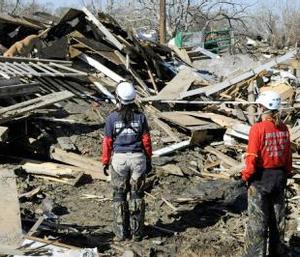Human Dimension Needed in U.S. Climate Research
WASHINGTON, DC, February 26, 2009 (ENS)
The U.S. government's Climate Change Science Program should expand its agenda to integrate research in the natural and social sciences that will enable the nation to tackle problems communities actually face, says a new report from the National Research Council.
Climate change already is changing people's lives with extreme weather and climate events and disasters; sea level rise and melting ice; fresh water scarcity; agriculture and food security; ecosystems management; new and re-emerging diseases; and effects on the U.S. economy, the committee acknowledges.
But the Climate Change Science Program is hindered by its limited research into the social sciences and the separation of natural and social sciences research. Spending on research into the human dimensions of climate change has never exceeded three percent of the program's research budget, the committee learned.
As a result, research, data collection, and modeling of how people interact with or affect their environments have lagged behind corresponding activities on the physical climate system.
At the same time, government scientists with the Climate Change Science Program should build on their successful research into the causes and processes of climate change, the report advises.
"CCSP has created a robust infrastructure for observations and modeling, which has enabled scientists to document trends in critical climate parameters and identify the human impacts on climate change," said Veerabhadran Ramanathan, chair of the committee that wrote the report, and distinguished professor of atmospheric and climate sciences at the Scripps Institution of Oceanography, University of California, San Diego.
"Now we need to know how to respond to climate change, while working closely with policymakers on mitigation and adaptation strategies," he said.
 |
A trained cadaver-locating dog works a pile of debris in Bolivar Peninsula, Texas, so that cleanup crews can start removing the mess months after Hurricane Ike left the area a disaster. December 6, 2008. Ike was the third most destructive hurricane to ever make landfall in the United States. (Photo courtesy FEMA) |
The knowledge gained from this integrative approach would guide the nation on choices to reduce the costs and risks of climate change impacts, the committee said, and provide early warning of changes that are abrupt and large enough to push climate and human systems past tipping points.
The report sets forth a laundry list of priorities for the future of the Climate Change Science Program - establish a U.S. climate observing system; develop new modeling capabilities for regional and decadal scale forecasts; strengthen research on adaptation, mitigation, and vulnerability; initiate a periodic national assessment of climate impacts and responses; and routinely provide policymakers with crucial scientific information, tools, and forecasts.
In 2007, the committee issued its first report, which evaluated the program's progress at the request of CCSP's former director.
For this second report, the National Research Council was asked to identify future priorities and lay out a framework to guide the evolution of the program.
The program should make transformational changes to adopt a holistic approach that connects research across disciplines and engages policymakers and other stakeholders, the committee said.
Another priority should be to help establish a U.S. climate observing system that includes physical, biological, and social observations to ensure that data needed to address climate change are available, the committee said.
"Even if people significantly reduce their greenhouse gas emissions, further climate change is inevitable," the committee warned. "Therefore, CCSP needs to have the capacity to explain what is happening to climate and why."
The CCSP should work with federal, state, and international agencies to establish and maintain a climate observing system, and determine the agencies' different roles and responsibilities for making the observations, archiving, and distributing data.
Climate modeling to date has been primarily at the global scale, with time scales only for the next hundred years, yet more information is needed at regional to local scales, the committee advised.
Finally, the CCSP should work with stakeholders to design and implement a comprehensive national assessment that identifies evolving science and human needs.
While CCSP is mandated to carry out a national assessment every four years, the last one involving a broad range of stakeholders was a decade ago.
The collection of 21 synthesis and assessment reports published from 2006 to 2008, although useful, the committee said, did not add up to a comprehensive national assessment.
Copyright Environment News Service (ENS) 2009. All rights reserved. To subscribe or visit go to: http://www.ens-newswire.com